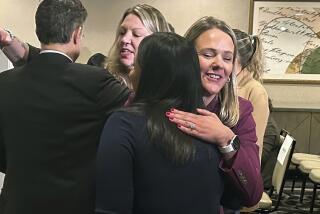Female inmate surgery broke law
SACRAMENTO â Dozens of women in California prisons were sterilized without the required approval of a state medical committee, officials said.
Some of the women say they felt coerced to undergo the surgery, and now state lawmakers are calling for an investigation.
âPressuring a vulnerable population -- including at least one documented instance of a patient under sedation -- to undergo these extreme procedures erodes the ban on eugenics,â the California Legislative Womenâs Caucus wrote in a letter to the federal receiver in charge of prison healthcare.
During a five-year period ending in 2010, at least 148 female inmates received tubal ligations that had not been approved, Joyce Hayhoe, a spokeswoman for the receiver, confirmed Friday. The allegations were first reported by the Center for Investigative Reporting.
Ten other women have alleged to the prisoner advocacy group Justice Now that they were sterilized improperly in procedures other than tubal ligation, including having their ovaries removed.
The operations were performed at outside hospitals and medical facilities by doctors under contract with the corrections department. Medical directors at the prisons recommended and approved the tubal ligations, Hayhoe said. Corrections officials found no evidence of sterilization performed on male prisoners.
She said the unauthorized sterilization involved inmates from the California Institution for Women in Corona and Valley State Prison in Chowchilla, and the operations were a clear violation of state law restricting procedures not considered medically necessary.
âOur physicians were not following the proper procedures,â she said. âThe first priority we had was to stop it from taking place, which we did in 2010.â
In every case, the women involved signed a written consent form, Hayhoe said, although some women told The Times they felt pressured or misled into giving consent.
New procedures to limit sterilizations were implemented in 2010, Hayhoe said. Since then, there has been only one such surgery and it was ruled medically necessary, she added.
Kelli Thomas of Los Angeles was an inmate in Chowchilla when she went into surgery for a biopsy and to have two cysts removed. She gave the doctor permission to remove her ovaries if cancer was found, she said, but she told him she hoped it wouldnât be necessary.
Thomas said she told the doctor she wanted to have children when she left prison, where she served a sentence for voluntary manslaughter of a domestic partner she said was abusive.
Her medical records show that no cancer was found but her ovaries were removed, according to Cynthia Chandler, co-founder of Justice Now and a law professor at Golden Gate University, who reviewed the records.
âI feel like I was tricked,â Thomas said. âI gave permission to do it based on a [cancer] diagnosis, and the diagnosis wasnât there.â
Daun Martin, a licensed psychologist who was the medical administrator at Chowchilla from 2005 to 2007, said none of the tubal ligations done at the prison were improper or done under coercion.
âThe women who had tubal ligations all signed consents. There was absolutely no harassment or pressure,â Martin said.
There was no intent to coerce the women into sterilization because of their race, ethnicity or troubled past, Martin said.
âWomen should be allowed to make decisions regarding their body -- in prison or out of prison,â Martin said.
âNobody at the prison had any intention of doing anything but what was in the best interest of the women.â
Martin acknowledged, however, having been unaware of the ban on tubal ligations not deemed medically necessary.
The legislative womenâs caucus, which represents 31 state lawmakers, has asked the receiver for a detailed report on the sterilizations.
âIn our view, such practice violates constitutional protections against cruel and unusual punishment; protections that you were appointed to enforce,â the caucus wrote.
Another group of lawmakers has asked the California Medical Board to investigate the physicians involved in unapproved sterilizations and âdetermine whether any disciplinary actions or license revocations are warranted.â
Hayhoe declined to say whether disciplinary action was taken against the prison doctors who approved the tubal ligations, citing restrictions on releasing information about personnel matters.
But she said the doctors involved âare no longer employedâ by the corrections department.
Prison officials said they have since briefed all prison medical directors and contract physicians about the restrictions on sterilizations and the need for prior consent.
--
More to Read
Get the L.A. Times Politics newsletter
Deeply reported insights into legislation, politics and policy from Sacramento, Washington and beyond. In your inbox three times per week.
You may occasionally receive promotional content from the Los Angeles Times.











